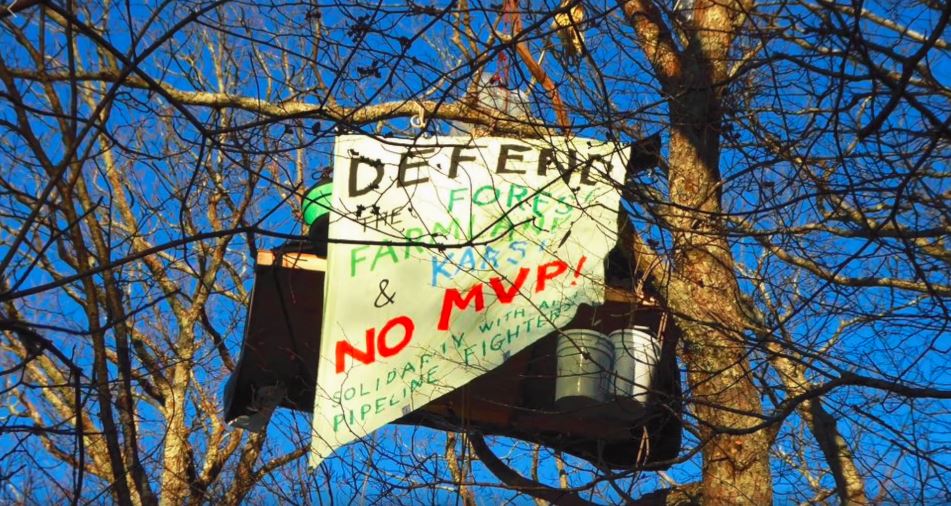The biggest regional land-clearing project since the federal highway program of the 1960s is now underway in Virginia and West Virginia. Fracked-gas companies Dominion Energy and EQT have been chain-sawing wide swaths of forests to make room for the Mountain Valley and Atlantic Coast pipelines (MVP and ACP). In the process, the companies are destroying ecosystems, ruining human livelihoods, and shocking the public’s conscience. And they’re just getting started.
Here’s the plot twist: Communities are fighting back…and winning!
Young people have bravely tied themselves to treetops to stop the MVP chainsaws in parts of Virginia and West Virginia. (You gotta, gotta, gotta watch this video). And a sympathetic local judge has made a surprise ruling in their favor, as you’ll see below. And just yesterday, a 61-year-old mother of three took to a tree on Virginia’s Poor Mountain to protest the pipeline for “as long as it takes.”
Then last week, in a stunning move, a key federal regulator told Dominion Energy to put away the ACP chainsaws completely until at least late summer. Why? The de-facto message from the feds: No corporation can ignore restrictions meant to protect vulnerable migratory birds just to satisfy nervous company executives and shareholders who see the rising protests and an ACP construction schedule that is falling further and further behind!
But it’s not all good news. Despite Governor Ralph Northam’s promise to hold these pipelines to the “highest environmental standards,” the Virginia Department of Environmental Quality late last week approved final and flawed environmental plans for construction of the 303-mile-long Mountain Valley Pipeline. About the same time, in one of the most heartbreaking moments yet, the MVP companies ripped down a wide stretch of forest trees on the property of George Jones. George is a wheelchair-bound Korean War veteran whose Giles County land has been in his family for ten generations. This Facebook post will make you cry.
Meanwhile, of the 600-mile path for the Atlantic Coast Pipeline, Dominion has already clear-cut about 200 miles of land the width of a six-lane highway across parts of West Virginia and Virginia. And the company doesn’t even HAVE its final approval from Virginia regulators. Talk about arrogant!
But then, on March 28, the Federal Energy Regulatory Commission refused Dominion’s behind-schedule plea to keep cutting trees during the critical migratory season for such birds as the red-tailed hawk and cerulean warbler. Defending the birds as well as endangered bat habitat, FERC said there can be no more tree cutting until late August at the soonest, giving protesters more time to make their public case against this reckless pipeline.
That’s why we are asking all Virginians to sign up to be part of a “watchful army” of citizen monitors tracking every single move the pipeline companies make on the ground.
What is the “watchful army”? The largest and best organized program we’ve ever heard of that is dedicated to supporting citizen efforts to monitor pipeline construction and operations on the ground and from the air. The brainchild of legendary Virginia activist Rick Webb, anyone concerned about harm from the ACP can sign up to be part of the Compliance Surveillance Initiative. Along the MVP route, groups have launched Mountain Valley Watch to monitor every step that EQT takes. The efforts will involve hundreds of volunteer observers across Virginia and West Virginia monitoring construction and reporting any violations. Citizen pilots are already flying planes above clear-cutting activities with high-resolution cameras. Activists on the ground are launching all manner of drones to get even closer with photos and video.
The result? Photographs of apparent construction, erosion, and tree-cutting violations have already been submitted to the Virginia Department of Environmental Quality for investigation. And notices of violations have already been issued against Dominion, with fines likely to follow. It’s always been unclear just how Dominion and EQT can remove the tops of entire mountain ranges for their pipelines (yes, that’s their plan) and stay within state and federal regulations for environmental protection.
With legions of people like you watching their every move, the answer may be this: they can’t.
Don’t forget to watch this video of the “tree sitters” on Peters Mountain in West Virginia, protesting the MVP tree cuts. When the pipeline companies tried to get Monroe County Circuit Court judge Robert Irons to remove the protestors, the judge said this: “There is no showing that there is a national shortage of gas, an emergency requiring immediate need of delivery of gas…or some other factor causing irreparable harm.”
In fact, the judge continued, the public’s interest is more closely aligned with the tree-sitters. The protestors “generally represent the interest of the public and the environment, such as the interest in protecting the waters underlying Peters Mountain, its flora and fauna, its view shed, the Appalachian Trail and similar interests that will or may be destroyed, if this request for a preliminary injunction is granted.”
Let those words sink in for a moment. It’s the beautiful sound of the TRUTH, spoken from someone whose sworn responsibility is to judge right from wrong. The protestors absolutely DO represent the public interest – against climate change, against greed, against harm to innocent farmers and landowners, against damage to drinking water.
Which is why MORE tree-sitting protests are being planned even as we speak, all along the MVP and ACP routes. Again, read this story and watch this interview with 61-year-old “Red” perched in a tree on Poor Mountain. Here’s the bottom line: You can’t build a pipeline if you can’t cut the trees. And even if you can cut the trees, what comes next is unprecedented in American history: trained citizen observers with clipboards, phones, planes, and even drones will watch every step the companies take. The question remains: Can any company actually construct radical pipelines – 42 inches thick – over steep mountain ridges and under delicate mountain streams while actually following the law? Or will dedicated citizens like you and me – committed to justice and environmental sanity – stop the companies in their tracks?
Now, the movement needs YOU. There are two things you can do:
- STEP ONE: Make an emergency donation today to support the brave landowners and young people still peacefully protesting the pipelines.
- STEP TWO: Sign up to be part of a “watchful army” of citizen monitors tracking every single move the pipeline companies make.
I, for one, am all in. I support the protesters. I’m joining the monitoring teams. Won’t you do the same? Isn’t this fight worth your time and money?
I know you’ll join us.
-Mike Tidwell





